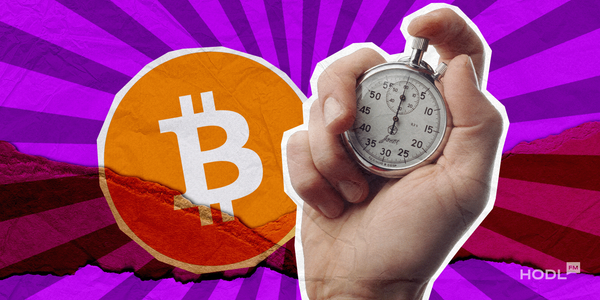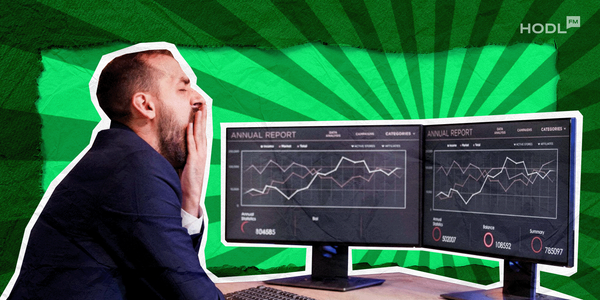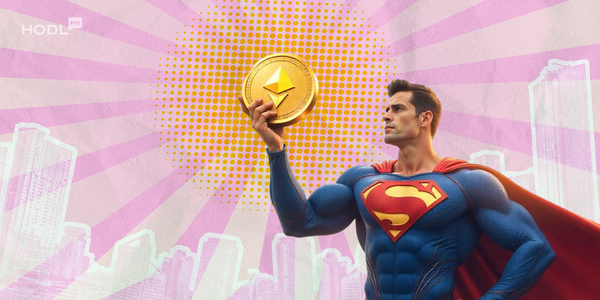Polymarket is a place where you can bet on anything from the next president to alien discoveries, all using cryptocurrency. It’s currently the world's largest blockchain-powered prediction market, with over 60,000 monthly active users in August 2024 alone.
What's fascinating about Polymarket is how it harnesses the wisdom of the crowd. As users buy and sell shares representing event outcomes, the market prices reflect real-time probabilities.
It's become so accurate that even mainstream media cite Polymarket odds in their reporting. Like, how crazy is that?
The platform uses smart contracts to automate the entire process, from placing bets to distributing winnings. In this article, we’ll look into Polymarket, breaking down what it is, how it works, and what you can do with it.
What is Polymarket?
Polymarket is a blockchain-based platform built on Ethereum and Polygon networks. It allows users to trade on the outcomes of various events, from election odds to celebrity gossip, using cryptocurrency.
Think you know who's going to win the next U.S. Presidential election? Wanna bet on whether Elon Musk will tweet something crazy next week? You can bet on all that and more on Polymarket. Fascinating, right?

How does Polymarket Work?
- Markets: Users can participate in markets based on different topics, such as politics, economics, entertainment, or sports.
- Trading: Participants buy shares in potential outcomes using USDC (USD Coin), a stablecoin pegged to the US dollar.
- Pricing: Share prices typically range from $0.01 to $1.00, reflecting the perceived likelihood of an outcome.
- Payouts: If a prediction is correct, the user receives $1 per share. If incorrect, they lose their investment.
- Smart contracts: The platform uses blockchain-based smart contracts to manage trades and ensure fair payouts automatically.
How to Use Polymarket
To use Polymarket, follow the provided steps.
- Sign up for an account,
- Connect an Ethereum wallet.
- Fund the account with USDC.
- Browse available markets and make trades.
Polymarket offers various types of markets, including binary outcomes, multiple choice, and numerical ranges. The platform is part of the growing decentralized finance (DeFi) ecosystem, which aims to provide financial services without traditional intermediaries.
How Are Markets Created and Managed on Polymarket?
Anyone can create a market on Polymarket and open up a world of prediction possibilities for everyone. People can create markets based on different events, be it political, economical, or even pop culture events.
But before you have a market on whether your neighbor’s dog will bark at 3 AM, be aware of these following rules in Polymarket.
They employ Automated Market Makers (AMMs), which are important for market making and trading. Polymarket allows any user to supply liquidity for any prediction market, unlike other prediction markets that have a single liquidity source. This system ordinarily leads to more liquid markets in comparison to other centralized ones.
In Polymarket, liquidity provision is encouraged by a reward system that is embedded within the platform. Liquidity providers get paid a percentage of each trade processed within the markets that they facilitate, which gives them the incentive to participate.
This mechanism helps to maintain the same level of liquidity in all markets, thus allowing for normal trades to occur and keeping the ecosystem of the platform healthy.
What Can Users Trade on Polymarket?
You can trade on everything from election odds to crypto prices, from sports outcomes to whether that influencer you follow will hit 10 million followers by next month.
Betting on elections is where Polymarket really shines brighter than a politician's teeth. During this 2024 U.S. presidential race, Polymarket has seen more action than a Michael Bay movie. People were throwing money around like it was confetti at a wedding.
In fact, election wagers on Polymarket hit a mind-boggling $1 billion in July alone. That's more zeros than a millennial's bank account. It seems predicting the political future is more popular than predicting the weather and probably about as accurate.
$920M worth of bets have been placed on @Polymarket's “Presidential Election Winner 2024”.
— NPC68 (@NPC_68) September 16, 2024
That is almost more than Polygons entire TVL ($947M)!$POL $MATIC pic.twitter.com/DDWUk8eLS3
This election fever has tripled the total value of crypto assets on prediction markets this year, according to DefiLlama. It's like the crypto world discovered politics and went all-in.
But it's not just politics. Crypto nerds can get their fix by betting on price movements. Sports fans can put their knowledge to the test. Heck, you can even bet on the weather if that's your jam. It's like online betting platforms met the stock market and had a wild night out.
How Does Polymarket Ensure Security and Transparency?
You might be wondering, "Is this platform really as secure as they claim?" Rest assured, Polymarket takes security more seriously than a bank vault guard on their first day.
Thanks to blockchain technology, Polymarket offers a level of transparency that's hard to match. Every bet, market, and outcome is recorded on the blockchain, creating an immutable ledger that's open for anyone to verify. This means you can track transactions with ease, giving you peace of mind about the integrity of the platform.
But that's not all. Polymarket employs smart contracts, which are like the unbiased referees of the crypto world. These automated programs execute trades and payouts based on predefined conditions, eliminating the need for human intervention and reducing the risk of manipulation. Once an outcome is determined, payouts are processed swiftly and efficiently.
What Legal and Regulatory Challenges Has Polymarket Faced?
Turns out, the governments aren't too thrilled about people betting on elections and other real-world events. Polymarket has had more run-ins with regulators than a teenager with a fake ID at a liquor store.
I can't even bet on my own country's political race because i live in America.
— RYAN SΞAN ADAMS - rsa.eth 🦄 (@RyanSAdams) July 25, 2024
Polymarket takes free markets and speech as inputs and outputs truth - this at a time when truth is needed more than ever.
The fact that U.S. users are blocked from using it tells you everything. pic.twitter.com/Y5FAMyLl6L
In 2022, the Commodity Futures Trading Commission (CFTC) slapped Polymarket with a $1.4 million fine for providing unregistered event-based binary options contracts. Apparently letting people bet on real-world events without proper registration is a no-no. Who knew?
But Polymarket isn't throwing in the towel just yet. Despite claiming to be based in Panama and having their Terms of Service screaming "No U.S. Allowed," some Americans still find their way. Bloomberg reports that U.S. residents are still getting their prediction fix on Polymarket.
How Does Polymarket Compare to Centralized Prediction Markets?
Comparing Polymarket to centralized prediction markets is like comparing Tesla to a horse-drawn carriage. Sure, they both get you from A to B, but one of them is a lot cooler and might spontaneously combust.

Centralized markets are like that friend who always says "trust me"—a bit sketchy. Polymarket, on the other hand, runs on blockchain, so you're trusting math and code. With Polymarket, every bet is visible on the blockchain, which eliminates the transparency issue found in the centralized market.
Because Polymarket operates on the Polygon network, the platform can settle bets very quickly, unlike centralized markets moving at the speed of bureaucracy. Another difference is that Polymarket is open 24/7 because the blockchain never sleeps, but centralized markets have opening hours. Furthermore, Polymarket doesn't care about borders, but centralized markets often stick to their local playgrounds.
Moreover, Polymarket can implement new features faster than you can update your smartphone. Centralized platforms move at the speed of... well, centralized institutions. If a centralized platform goes down, it's game over. Polymarket? It's like trying to shut down the internet, good luck with that.
Lastly, centralized markets often charge fees that make your wallet weep. Polymarket's fees are generally lower, though gas fees can sometimes make you question your life choices.
What is the Future Outlook for Polymarket?
Polymarket is shaking up the prediction game, proving that crypto can do more than just ride the hype rollercoaster. The platform is expanding beyond anticipating who politicians will foot-in-mouth next.
A recent Fed rate decision drew $60 million in betting about "economic uncertainty." This unprecedented surge suggests decentralized finance is rapidly maturing, evolving from a niche experiment to a formidable player in the financial landscape. Polymarket's success suggests that blockchain tech can create financial tools that are actually useful, not just fancy digital collectibles.
Additionally, Polymarket aims to enhance its platform with advanced analytics, more payment options, and user governance features. Experts anticipate Polymarket's expansion into a global leader in the prediction market space.
If Polymarket continues to gain traction, it’ll most likely face more regulatory issues. Plus, the platform's future is about as predictable as, well, the markets it's based on. Still, if Polymarket can navigate these typical crypto-related problems, it might just revolutionize how we interact with global events. Who knows? Maybe one day we'll all be betting on the weather instead of just complaining about it.

Disclaimer: All materials on this site are for informational purposes only. None of the material should be interpreted as investment advice. Please note that despite the nature of much of the material created and hosted on this website, HODL FM is not a financial reference resource and the opinions of authors and other contributors are their own and should not be taken as financial advice. If you require advice of this sort, HODL FM strongly recommends contacting a qualified industry professional.





